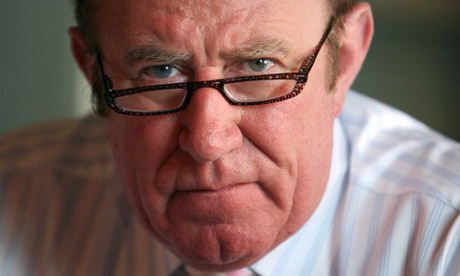A bizarre performance by former TV presenter Johnny Ball on Wednesday's edition of The Daily Politics show has once again highlighted the BBC's unsuccessful struggle to balance accuracy and impartiality when it comes to climate change.
During his short studio slot at the end of the programme, Ball harangued the transport secretary, Philip Hammond, and the former chancellor Alistair Darling about both energy policy and the way in which climate change is presented in a GCSE chemistry textbook.
Presumably, Ball was invited on the political programme because of the recent highly publicised, but unsubstantiated, allegations that his "sceptical" views on climate change have made him the target of a smear campaign.
Apart from his rant at the politicians, the former Think of a Number presenter also provided a blogpost and short video to promote his views, including his claim that "only 4% of the carbon dioxide that goes into the atmosphere is put there by man".
This argument is a common tactic employed by sceptics to create confusion over the role of greenhouse gas emissions in climate change.
Carbon dioxide levels varied between about 180 and 300 parts per million during the 650,000 years prior to industrialisation, as recorded in air bubbles trapped in ice in Antarctica.
But since industrialisation began in the 18th century, the concentration of carbon dioxide in the atmosphere has increased from about 280 to 390ppm – a rise of about 40%.
Globally each year, the land and atmosphere exchanges about 120bn tonnes of carbon, while the oceans and atmosphere transfer about 90bn tonnes of carbon between them. In general this natural carbon cycle is more or less in equilibrium, such that there is no significant net change in the amount of carbon absorbed in the atmosphere, oceans and land.
But we also know that human activities, such as burning fossil fuels, producing cement and destroying rainforests, have disturbed the natural equilibrium of the carbon cycle by emitting an additional 7bn tonnes of carbon into the atmosphere each year. The land and oceans absorb about 45% of this, but the remainder stays in the atmosphere and leads to the annual increases in concentration which have been recorded in the measurements from Mauna Loa, Hawaii, and elsewhere around the world.
While the volume of carbon dioxide that is exchanged between natural sources and sinks looks a lot larger, there really is no dispute over human responsibility for the 40% rise in concentrations in the atmosphere, and Andrew Neil, the presenter of The Daily Politics, should have challenged Ball's attempted obfuscation.
But Neil has a track record of regurgitating sceptics' claims on his own BBC blog. For instance, he has stated that "Himalayan glaciers have not in any way exhibited, especially in recent years, an abnormal annual retreat," when in fact scientific studies have found evidence of a clear, but complicated, response to global warming.
The Daily Politics is not the only BBC programme where climate change sceptics have been able to make – unchallenged – inaccurate and misleading statements. The Today programme allowed Prof Ian Plimer to tell listeners that volcanoes produce most emissions of carbon dioxide, even though the United States Geological Survey and others have pointed out that human activities are responsible for about 100 times more each year. And Newsnight is notorious for entertaining its viewers to confrontations between research scientists and sceptic opponents, such as a debate, between the director of the World Climate Research Programme and a British blogger over the possible influence of climate change to the flooding in Pakistan.
The main reason for this "balancing act" is the conflicting interpretation of the commitments in the BBC charter to both accuracy and impartiality. Some BBC editors and presenters appear to treat climate change and other areas of science as if they are just matters of opinion, rather than fact, and impartiality means promoting different points of view, without any apparent responsibility to check their accuracy.
Indeed, it was tensions over this balance that led the BBC Trust last year to launch a review of impartiality in the broadcaster's coverage of science. The head of the review, Prof Steve Jones, is due to announce his findings in the next few weeks. It is to be hoped that he encourages BBC editors and presenters to be less uncritical of misleading and inaccurate statements by self-proclaimed climate change sceptics.
• Bob Ward is policy and communications director of the Grantham Research Institute on Climate Change and the Environment at London School of Economics and Political Science.

